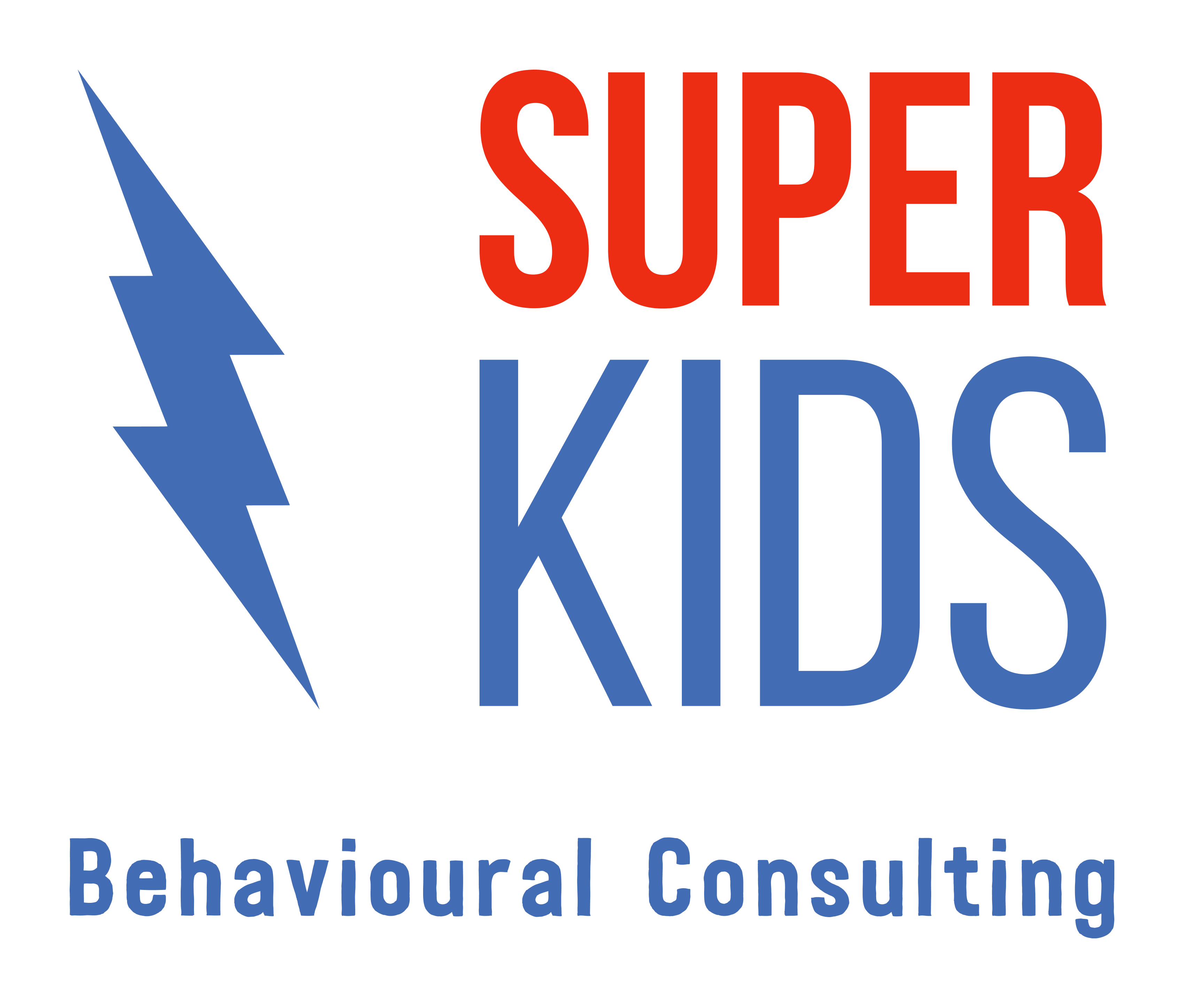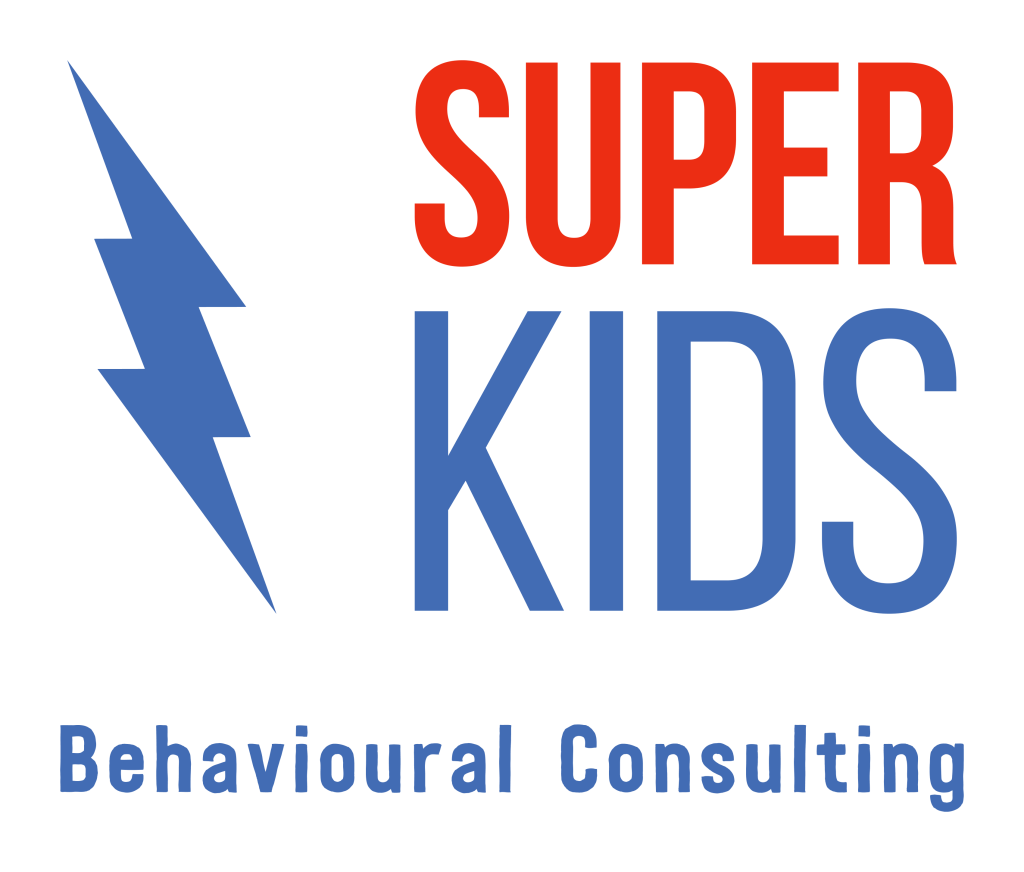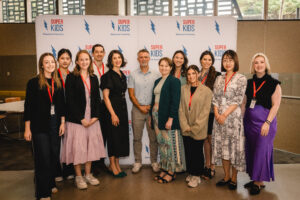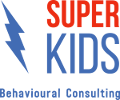Autism Spectrum Disorder (ASD)

Renee Collins
Clinical Director

What is Autism Spectrum Disorder (ASD)?
Autism Spectrum Disorder (ASD) is a lifelong neuro-developmental disorder. It’s a broad diagnosis and will affect each individual with ASD differently. Current data indicate that 1 in 50 children are affected by ASD worldwide (CDC, 2013).
It is estimated that more than 1 in 100 people in Australia are Autistic and males are 3.5 times more likely to have Autism than females (Source: ABS SDAC 2022– Autism in Australia).
The American Psychiatric Association’s Diagnostic and Statistical Manual, Fifth Edition (DSM-5) provides standardized criteria to help diagnose ASD. This criteria focuses on two core areas: social communication and restricted or repetitive behaviours. To meet the diagnostic criteria, individuals must exhibit persistent deficits in social communication and interaction across multiple contexts, including challenges in social-emotional reciprocity, nonverbal communicative behaviours, and developing, maintaining, and understanding relationships. Additionally, they must display at least two types of restricted, repetitive patterns of behaviour, interests, or activities, such as repetitive motor movements, insistence on sameness, highly restricted interests, or hyper- or hypo- reactivity to sensory input. Symptoms must be present in early developmental stages, cause significant impairment in daily functioning, and not be better explained by intellectual disability or global developmental delay.
Autism is a spectrum disorder, which means that individuals with ASD can experience a wide range of symptoms and abilities. The DSM-5 allows for specifying severity along the spcrtum, based on the level of support required (Level 1, 2 or 3).
Level 1 requires some support, with noticeable communication and social challenges. Individuals may struggle with social interactions but can function with minimal assistance.
Level 2 requires substantial support due to more pronounced difficulties in social skills and restricted, repetitive behaviors, impacting daily activities.
Level 3 represents the highest level of need, requiring very substantial support. Individuals at this level have significant challenges in social communication, alongside more pervasive, repetitive behaviours. Understanding these levels helps tailor interventions and support to meet individual needs effectively.
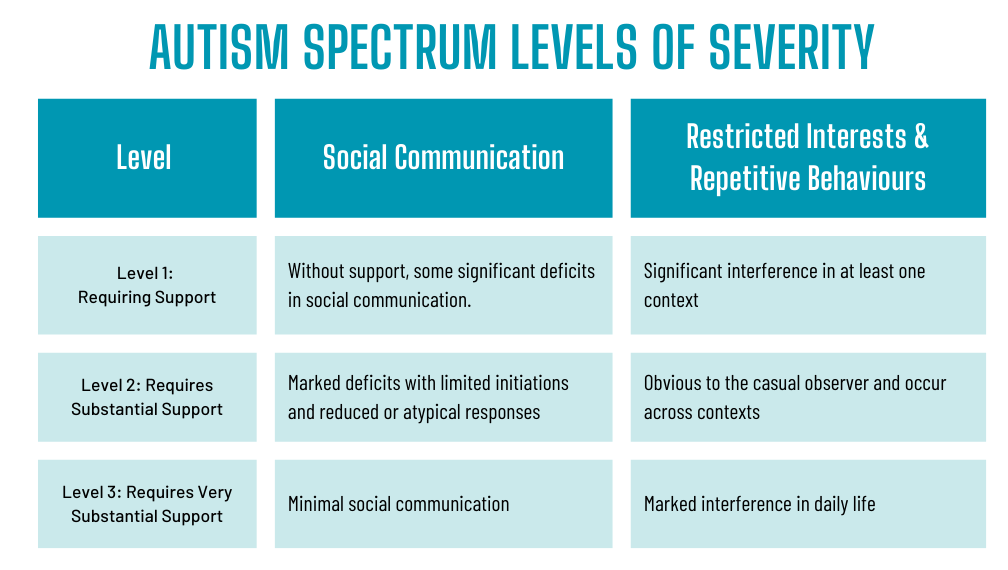
Intellectual disability and autism spectrum disorder frequently co-occur; to make comorbid diagnoses of ASD and intellectual disability, social communication should be below that expected for the general developmental level.
Whilst ASD is not a mental health problem nor intellectual disability, these challenges may also be present.
There is currently no known cause of autism. Research suggests ASD results from changes to brain growth and development, which may be influenced by genetic factors. Whilst research for causes is still ongoing, we are more confident in what does not cause autism – parenting, social circumstances, vaccines or other medical treatments are certainly not to blame!
Diagnosing Autism
The characteristics of autism usually start in infancy, but may not be noticeable until the age of 2 or 3 years. Sometimes ASD is diagnosed much later in life. Ideally, however, ASD should be diagnosed early, as research shows early detection and intervention can decrease risk of bullying, abuse, mental health difficulties and social challenges. Conversely, early intervention facilitates communication, social interaction and independence, and draws out the many strengths and interests of people with ASD. Diagnosis is sometimes difficult and can be less reliable for children younger than age 2, as there is no conclusive medical test like blood test that can confirm ASD. A paediatrician, psychiatrist or psychologist can provide a diagnosis by reviewing the individual’s developmental history and behaviour.
Most children in Australia are diagnosed with ASD by professionals using the Diagnostic and Statistical Manual of Mental Disorders (DSM). The fifth version of this manual, the DSM-5, has been used since 2013. The diagnostic evaluation may be conducted by either:
- One health professional, such as a paediatrician, psychiatrist or psychologist
- A team of health professionals, a multidisciplinary team will include a paediatrician (or child and adolescent psychiatrist), a psychologist and a speech pathologist, but other health professionals may provide input if required.
Intervention and therapy options for Autism
- Early intensive behavioural intervention: Behavioural approaches focus on developing helpful behaviours and skills and decreasing unhelpful or dangerous behaviours (e.g. self-injury) by understanding what happens before and after behaviour. Applied Behavioural Analysis (ABA) is a common, evidence-based example of a behavioural treatment, and the one adopted here at Super Kids!
- Developmental: Developmental approaches focus on improving specific developmental skills. The most common examples would be Speech and Language Therapy (to improve understanding use of communication strategies) and Occupational Therapy (to improve independent living in areas such as dressing, eating, hygiene and relating to others).
- Pharmacological/Medication: There are no medications that treat the core symptoms of ASD. Some medications treat co-occurring symptoms that can help people with ASD function better. For example, medication might help manage high energy levels, inability to focus, or self-harming behaviour, such as head banging or hand biting.
- Psychological: Psychological approaches can help people with ASD cope with anxiety, depression, and other mental health issues. Cognitive-Behaviour Therapy (CBT) is one psychological approach where the therapist works together with the individual to identify goals and then change how the person thinks about a situation to in turn change how they react to and feel about the situation.
Where to go from here?
Below are some helpful resources with more information about autism. You can also explore our Super Kids website for more information on autism, Applied Behavioural Analysis (ABA), the different services we offer, guidance on whether intervention is needed, and answers to commonly asked questions.
Information on ASD and Common Myths: https://www.amaze.org.au/wp-
content/uploads/2021/09/ Common-autism-myths-infosheet. pdf National Autism Hotline: 1300 308 699
Autism Spectrum Australia: https://www.autismspectrum.
org.au Autism Awareness Australia: https://www.autismawareness.
com.au
Super Kids acknowledges each individual’s personal preference to use identity-first or person-first language to describe themselves or their loved one. We interchangeably use both language conventions and therefore refer to both Autistic children and children with Autism.
